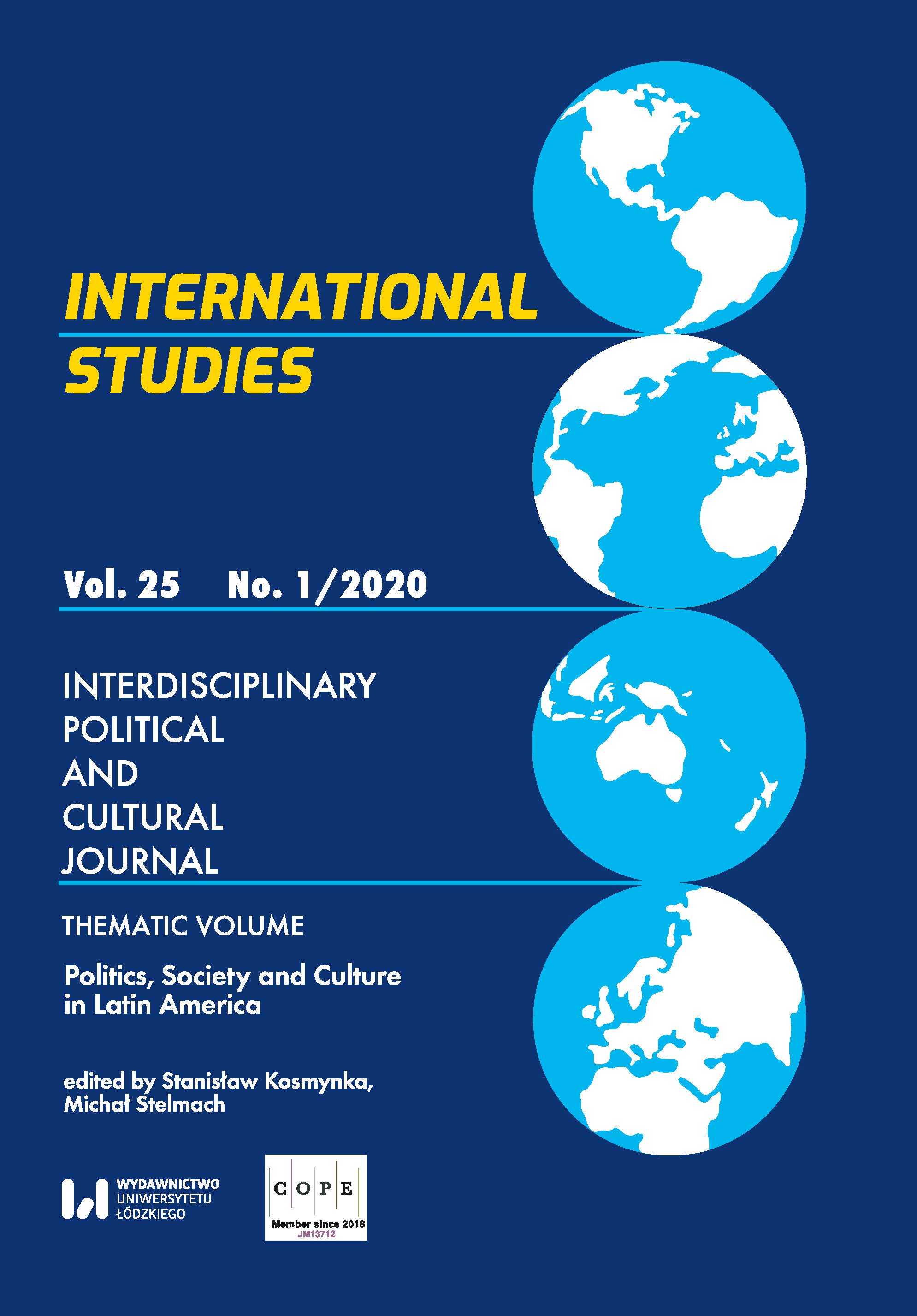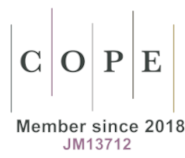Towards Homes and Graves. About the Returns, Desaparecidos and Exhumation Challenges in Peru at the End of the Twentieth Century
DOI:
https://doi.org/10.18778/1641-4233.25.04Słowa kluczowe:
Peru, internal conflict, forced disappearances, return migrations, Fujimorism, memory studies, forensics, exhumationsAbstrakt
The article concerns the wartime history of Peru and examines both topdown and bottom-up practices of accounting for the internal conflict of 1980–2000, which were initiated in the background of the warfare. The aim of the article is to discuss the connections I observed between the phenomena referred to in the title: return migrations of the inhabitants of the central-southern province, their search for the victims of forced disappearances, as well as the exhumation challenges emerging since the beginning of the war. In other words, the text constitutes an attempt to contextualise the above-mentioned issues given competing versions of memory about political violence in the Andes, with particular focus on their top-down determinants in the Fujimorism era.
Pobrania
Bibliografia
Anstett, E. and J.-M. Dreyfus. Human Remains and Identification. Mass Violence, Genocide, and the “Forensic Turn.” Manchester: Manchester University Press, 2015.
Zobacz w Google Scholar
DOI: https://doi.org/10.7228/manchester/9780719097560.001.0001
Baranowska, G. Wymuszone zaginięcia w Europie. Kształtowanie się międzynarodowych standardów zapobiegania i egzekwowania odpowiedzialności państw. Warszawa: C.H. Beck, 2017.
Zobacz w Google Scholar
Barrantes Segura, R. “Reparations and Displacement in Peru.” Case Studies on Transitional Justice and Displacement. International Center for Transitional Justice (ICTJ), July 2012.
Zobacz w Google Scholar
Crenzel, E. “Desaparciones forzadas de personas: verdad y justicia de transición en la Argentina.” Políticas en justicia transicional. Miradas comparativas sobre el legado de la CVR. Eds. L. Huber, P. del Pino, Lima: Instituto de Estudios Peruanos, 2015.
Zobacz w Google Scholar
CVR, Hatun Willakuy. Versión abreviada del Informe Final de la Comisión de la Verdad y Reconciliación. Perú, Lima: CVR, PUCP, Defensoría del Pueblo, 2008.
Zobacz w Google Scholar
CVR, “Iniciativa de desaparecidos”. Informe Final CVR. Anexo 8, Lima 2003.
Zobacz w Google Scholar
CVR, “Las desapariciones forzadas.” Informe Final CVR, Tomo VI, Lima 2003.
Zobacz w Google Scholar
CVR, “Plan Nacional de Investigaciones Antropológico-Forenses.” Informe Final CVR, Tomo IX, Lima 2003.
Zobacz w Google Scholar
Degregori, C. I. La década de la Antipolítica. Auge y huida de Alberto Fujimori y Vladimiro Montesinos. Lima: Instituto de Estudios Peruanos, 2000.
Zobacz w Google Scholar
Degregori, C. I. Qué difícil es ser Dios. El Partido Comunista del Perú – Sendero Luminoso y el conflicto armado interno en el Perú: 1980–1999, Instituto de Estudios Peruanos, 2013.
Zobacz w Google Scholar
Del Pino, P. “Tiempos de Guerra y de dioses: Ronderos, evangélicos y senderistas en el valle del río Apurímac.” Las rondas campesinas y derrota del Sendero Luminoso. Ed C. I. Degregori, Lima: Instituto de Estudios Peruanos, 1996.
Zobacz w Google Scholar
Desaparición forzada en el Perú, Equipo Peruano de Antropología Forense, Lima (date of publication not included).
Zobacz w Google Scholar
Dinges, J. The Condor Years. How Pinochet and His Allies Brought Terrorism to Three Continents, New York: The New Press, 2004.
Zobacz w Google Scholar
Domańska, E. Nekros. Wprowadzenie do ontologii martwego ciała. Warszawa: Wydawnictwo Naukowe PWN, 2018.
Zobacz w Google Scholar
Fumerton, M. “Beyond Counterinsurgency: Peasant Militias and Wartime Social Order in Peru’s Civil War.” European Review of Latin American and Caribbean Studies 105 (2018): 61–86.
Zobacz w Google Scholar
DOI: https://doi.org/10.18352/erlacs.10374
Gorriti, G. Sendero Luminoso. Historia de la guerra milenaria en el Perú. Tomo I. Lima: Editorial Apoyo, 1990.
Zobacz w Google Scholar
Gutiérrez Figueroa, F. “El Delito de Desaparición Forzada de Personas en el Perú y su adecuación al Estatuto de Roma que crea la Corte Penal Internacional”. Foro Jurídico, 12 (2013): 193–201. Web. 30 May 2020. http://revistas.pucp.edu.pe/index.php/forojuridico/article/view/13814
Zobacz w Google Scholar
Jankowska, M. Underground – baśń o Jugosławii. Web 26 March 2019. https://www.literatura.gildia.pl/tworcy/magdalena_jankowska/swiat_wedlug_emira_kusturicy/fragment
Zobacz w Google Scholar
Jelin, E. Los trabajos de la memoria. Lima: Instituto de Estudios Peruanos, 2012.
Zobacz w Google Scholar
Jiménez, E. Chungui. Violencia y trazos de memoria. Lima: Instituto de Estudios Peruanos, 2009.
Zobacz w Google Scholar
Kruijt, D. and M. del Pilar Tello. “De los reformistas militares a la dictadura civil.” Ejércitos políticos. Las fuerzas armadas y la construcción de la nación en la era de la democracia. Eds. K. Koonings, D. Kruijt, Lima: Instituto de Estudios Peruanos, 2003.
Zobacz w Google Scholar
“Ley de búsqueda de personas desaparecidas durante el período de violencia 1980–2000.” Diario el Peruano, June 22, 2016.
Zobacz w Google Scholar
Los Desplazados. 600 000 ciudadanos peruanos sin derechos. Lima: Asociación Pro Derechos Humanos, Lima 2000.
Zobacz w Google Scholar
Los Muertos de Ayacucho. Violencia y sitios de entierro clandestinos. Lima: Comisión de Derechos Humanos, 2012.
Zobacz w Google Scholar
Lozano Martínez, F. J. Desplazados por violencia en asentamientos humanos de Huanta y Lima. Perú, Guadalajara: Universidad de Guadalajara, 2011.
Zobacz w Google Scholar
Łaciński, P. „Koncepcja i praktyka polityczna fujimorizmu – system polityczny Peru w latach 1990–2000.” Ameryka Łacińska 3–4 (2004): 63–81.
Zobacz w Google Scholar
Manrique, N. El tiempo del miedo. La violencia política en el Perú 1980–1996. Lima: Fondo Editorial del Congreso, 2002.
Zobacz w Google Scholar
Mesa nacional sobre desplazamiento – SEPIA, “Balance del proceso de desplazamiento por violencia política en el Perú (1980–1997).” Amérique Latine Histoire et Mémoire. Les Cahiers ALHIM 5 (2002). Web. 26 February 2019 http://journals.openedition.org/alhim/647
Zobacz w Google Scholar
Murakami, Y. Peru en la era del Chino. La política no institucionalizada y el pueblo en busca de un salvador. Lima: Instituto de Estudios Peruanos, 2018.
Zobacz w Google Scholar
Niedźwiedzki, D. Migracje i tożsamość. Od teorii do analizy przypadku. Kraków: Nomos, 2010.
Zobacz w Google Scholar
O’Brien, E. The Exhumation of Mass Graves by International Criminal Tribunals: Nuremberg, the former Yugoslavia and Rwanda, National University of Ireland Galway, 2013. Web. 10 March 2016 http://hdl.handle.net/10379/2718
Zobacz w Google Scholar
Oliart, P. “Alberto Fujimori: El hombre que el Perú necesitaba?” Los senderos insólitos del Perú. Guerra y sociedad 1980–1995. Ed. S. Stern, Lima: IEP/UNSCH, 1999.
Zobacz w Google Scholar
Pietraszczyk, J. „Peruwiańskie Komitety Samoobrony – w poszukiwaniu nowej roli społecznej.” Doświadczenie demokracji w Ameryce Łacińskiej. Eds. M. Kania, A. Kaganiec-Kamieńska, Kraków: Wydawnictwo UJ, 2008.
Zobacz w Google Scholar
Pietraszczyk-Sękowska, J. “Los Comités de Autodefensa del Perú. Un estudio de la identidad de los campesinos armados.” Estudios Latinoamericanos, 29 (2009): 131–42.
Zobacz w Google Scholar
Pietraszczyk-Sękowska, J. „Powroty po(do) bliskich. O paradoksach migracji powrotnych i ich związkach z poszukiwaniami desaparecidos w Andach peruwiańskich końca XX i początku XXI wieku”. Ameryka Łacińska 1 (2020): 15–38.
Zobacz w Google Scholar
DOI: https://doi.org/10.36551/20811152.2020.107.02
Portocarrero, G. Razones de sangre. Aproximaciones a la violencia política, Lima: Pontífica Universidad Católica del Perú, 1998.
Zobacz w Google Scholar
Ricoeur, P. Pamięć, historia, zapomnienie, Kraków: Universitas, 2012.
Zobacz w Google Scholar
Rodriguez Vargas, M. and O. Espinosa de Rivero. Multiples retornos a una misma tierra. La situación del pueblo Asháninka de los ríos Tambo y Ené – Selva Central. Lima: Centro Amazónico de Antropología y Aplicación Práctica, 1997.
Zobacz w Google Scholar
Rojas Baeza, P. La interminable ausencia. Estudio médico, psicológico y político de la desaparición forzada de personas. Santiago: LOM Ediciones, 2009.
Zobacz w Google Scholar
Rojas-Perez, I. Mourning Remains. State Atrocity, Exhumations, and Governing the Disappeared in Peru’s Postwar Andes. Stanford: Stanford University Press, 2017.
Zobacz w Google Scholar
DOI: https://doi.org/10.1515/9781503602632
Salcedo, J. M. Las tumbas de Uchuraccay. Treinta años después. Iquitos: Tierra Nueva, 2013.
Zobacz w Google Scholar
Sendyka, R. „Nie-miejsca pamięci i ich nie-ludzkie pomniki.” Teksty Drugie 2 (2017): 86–108.
Zobacz w Google Scholar
DOI: https://doi.org/10.18318/td.2017.2.5
Skoczek, M. „Zmiany mobilności przestrzennej ludności Ameryki Łacińskiej jako efekt globalizacji”. Ameryka Łacińska wobec wyzwań globalizacji. Ed. M.F. Gawrycki, Toruń: Adam Marszałek, 2006.
Zobacz w Google Scholar
Starn, O. “Senderos inesperados: las rondas campesinas de la sierra sur central.” Las rondas campesinas y la derrota de Sendero Luminoso. Ed. C.I. Degregori, Lima: IEP, 1999.
Zobacz w Google Scholar
Stelmach, M. „Peruwiańskie Siły Zbrojne w procesie transformacji demokratycznej.” Transformacje w Ameryce Łacińskiej. Ed. A. Walaszek, A. Giera, Kraków: Księgarnia Akademicka, 2011.
Zobacz w Google Scholar
Śniadecka-Kotarska, M. Być kobietą w Peru. Warszawa: Centrum Studiów Latynoamerykańskich UW, 2006.
Zobacz w Google Scholar
Śniadecka-Kotarska, M. „Od populizmu i umacniania demokracji do dyktatury i terroru – ewolucja rządów prezydenckich w Peru w latach 1990–2000.” Cultura et politica: Studia i rozprawy dedykowane profesorowi Jerzemu Kmiecińskiemu. Eds. M. Olędzki, A. Stępień, Łódź: Wydawnictwo UŁ, 2005.
Zobacz w Google Scholar
Tamayo, A. M. “ANFASEP y la lucha por la memoria de sus desaparecidos (1983–2000).” Jamás tan cerca arremetió lo lejos. Memoria y violencia política en el Perú. Ed. C.I. Degregori, Lima: Instituto de Estudios Peruanos, 2003.
Zobacz w Google Scholar
Tapia, C. Las Fuerzas Armadas y Sendero Luminoso. Dos estrategias y un final. Lima: Instituto de Estudios Peruanos, 1997.
Zobacz w Google Scholar
Tarczyński, P. “Genocide – Politicide. Ludobójstwo w Argentynie: 1976–1983.” Kulturowe wymiary ludobóíjstwa. Ed. R. F. Muniak, Łódź: Officyna, 2012.
Zobacz w Google Scholar
Theidon, K. “Justice in Transition. The Micropolitics of Reconciliation in Post-War Peru”. Journal of Conflict Resolution 50.3 (2006): 433–457.
Zobacz w Google Scholar
DOI: https://doi.org/10.1177/0022002706286954
Uceda, R. Muerte en el Pentagonito. Los cementerios secretos del Ejército Peruano. Bogotá: Editorial Planeta Colombiana, 2004.
Zobacz w Google Scholar
Urrutia, J. Aquí nada ha pasado. Huamanga siglos XVI-XX. Lima: Instituto de Estudios Peruanos, 2014.
Zobacz w Google Scholar
Zevallos Trigoso, N. Desplazamientos Internos en el Perú, Lima: Organización Internacional para las Migraciones, 2015.
Zobacz w Google Scholar
Pobrania
Opublikowane
Jak cytować
Numer
Dział
Licencja

Utwór dostępny jest na licencji Creative Commons Uznanie autorstwa – Użycie niekomercyjne – Bez utworów zależnych 4.0 Międzynarodowe.

















